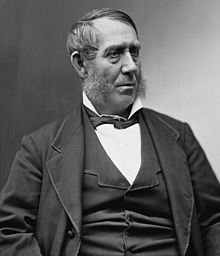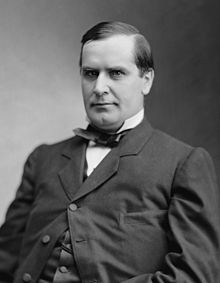by Steve Reiss (stevenreiss@scienbizippc.com)
On December 19, 1878, in the US Senate, during speeches on proposed changes to the patent laws, Isaac P. Christiancy (March 12, 1812 – September 8, 1890), U.S. Senator from the state of Michigan gave an incredibly long-winded and somewhat pompous speech on his opinion of the state of the US patent system. The speech went on for more than 6 columns of the day's Congressional Record (pp. 306-09)(emphasis added).
 |
| Isaac Christiancy |
Excerpts from his speech are below:
Mr. CHRISTIANCY. Mr. President, I have some remarks to submit upon some of the questions alluded to in the amendments proposed by the Senator from Illinois, but I shall confine myself, so far
as they are concerned, mainly to those offered to the second section on the subject of profits. Before coming to that, however, I have some general views upon the present patent system as a whole, which I wish to submit to the Senate, and in doing so I shall touch many of the points that have already been alluded to.
...
I am compelled to say, that not even an injunction from a court of equity, nor the more affirmative and forward impulse of a mandamus from a court of law, nor any other process known to gods or men, can make me feel or express a like admiration, or any admiration, veneration, or gratitude, for those men, however numerous and otherwise respectable, whose inventive genius and expansive patriotism have exhausted themselves in the invention of a corn-popper, an improved rolling-pin, a clothes-pin, a wardrobe-hook, a cigar-holder, an improved clasp for a lady's back hair, or for her stocking-supporter or artificial palpitators, nor even of a toy popgun, or a baby-whistle, nor for that more lofty flight of genius which has secured a patent for a mustache guard for keeping a gentleman's mustache out of his tea or coffee, and which could as well be accomplished by shortening the mustache just a little, still leaving it in good working order; nor for the equally, beneficent genius who, to save the hens the labor of hatching their eggs, has contrived an incubator to hatch them for her.
Nor is my admiration nor my sympathy greatly excited over the vast amount of brain-power expended by the man who, sitting by a kitchen cook-stove or a dining-room table perhaps, with a piece of wire in his hand, and noticing that a hot plate will burn the naked fingers, happens to think of bending the wire into such form as to lift the plate without burning the fingers, and then straightway applies for and obtains a patent for the invention, to be followed, perhaps, by other patents for improved methods or forms of bending the wire or attaching a handle; nor for the swarm of other equally important patented inventions with which the kitchen of every family is infested and lumbered up, unless they set their faces against all the vendors of such patents, as they would against the traveling insurance agents, lightning-rod vendors, and organ-grinders who undertake to prowl around their premises.
Many of these insignificant inventions may be convenient enough, if they could be kept always in the convenient spot to be used just when they may each be wanted. But those contrived for the use of
the kitchen are so numerous that no ordinary kitchen has room for all of them, and more time and trouble would be spent in selecting each as it is wanted, than would be taken in doing the particular item of work in the old unpatented method.
Mr. President, what I have been saying upon the insignificance of some of the patents which have been granted may seem to be beneath the dignity of the Senate—like mere trifling and a waste of time but when the Patent Office of the United States will condescend to the granting of patents giving exclusive privileges for such trifles, each of which may become the prolific mother of a brood of lawsuits, I do not think I can justly be charged with trifling when I bring these matters to the attention of the Senate and the country, and ask that some measures should be adopted to get rid of this kind of trifling.
I have ave no hostility against the Patent Office; I think it has been a useful institution. It is self-supporting also, which cannot be said of any other Government bureau. It has always been administered by faithful, studious, and laborious men, and few idlers have been found there. But much time and labor, I insist, have of late years been spent in the investigation of applications for patents for these trifling matters, which ought to have been promptly rejected, as not, upon the whole, sufficiently useful and important to justify the issuing of patents.
Here, for instance, is a list selected from only a few pages, a small part of the list of patents granted in the year 1876. It does not include one tithe of the equally insignificant, if not ludicrous, patents
issued in that year alone:
For a croquet apparatus; mustache-guard for cups; incubator for hatching eggs; protector for studs or sleeve-buttons; weaning-bit for calves; clothes-sprinkler; lamp-wick trimmers; plate-lifter; bustle; corsets, (several patents;) skates, (several patents;) spring-bed-bottoms, (several patents;) corset with pad; croquet-mallet; spring pillow; stilts; music-leaf turner, (several patents,) all useless, and worse than useless, as there is always a crowd of the opposite sex who are pressing to perform that agreeable labor for the player; toy popgun; corn-popper; fly-trap,(several patents;) shawl-bag; candy; penholders; wash-basin; suspender end; bell-toy; fire-kindler; tobacco pipe; playing cards; lamp-chimney holder; clasp for pocket-book; rolling-pin; step-ladder; machine for forming pop-corn balls; dice box; cigar-pouch; egg-beater; fastening for sleeve-buttons; suspender loops; support for nursing-bottle; mop-wringers, (several patents); scissors-sharpener; stud and button; baby-jumper; clasp for bird cages: book-support; wardrobe-hook; rein-holder; game-counter; e-table; bottle-stopper, (which would be valuable if it always stopped the bottle at the right moment;) toy-pistol; pencil-sharpener;
carpet-fastener; stove-lid lifter; tape for hoop-skirts; ironing-board; skirt-supporter; dish-drainer; suspender-fastener; tooth pick; clothes-pounder; eye-glass holder; bow and arrow (very essential in the present stage of human progress); pot-cover; shirt-bosom; cork screw; hair-pin; hat and coat hook; toy cap-exploder; coffee pot; halter; ironing-stand; mop-holder; gate-latch; sad-iron; corset-spring; shirt-protector; shoe-fastener; Shirt; gate-hinge; hair crimper; rolling toy; milk-can cover; toy blow-horn; umbrella support; corset-steel; carpet-stretcher and tack-driver; glove-fastener; thimble; perch for bird-cage; ladle; lamp-extinguisher; bust-supporter; underwaist; nutmeg-grater; milk-cooler; device for removing wires from bottle-corks; lamp-chimney cleaner; buttonhole attachment; holder for tumblers; machine for paring, slicing, and coring apples; pantaloons; bottle-washing machine, &c.
I have omitted several which I could not properly mention in the hearing of the galleries, and I have gone over but a few pages of the list granted in a single year. . It is safe to say that, in that year alone
from one thousand to fifteen hundred patents were granted, as insignificant and useless as those I have given; not one of which, in my opinion, ought ever to have been granted; and to have refused
them all would have given to the applicants no just ground to complain of the ingratitude of republics, nor would the progress of civilization have been seriously retarded.
It is quite obvious, I think, that if there had been no Patent Office in existence, and the discretion of Congress, had been appealed to upon the merits of each case, not one of them would have been granted. I go much further than this, and say that of all the patents for the last ten years, at least three-fourths are utterly worthless, and never would have been granted had they depended upon the judgment and discretion of Congress [SR NOTE: This is statement is from the same set of speeches where Senator Kirkwood announced not being familiar with the US patent laws and an expectation that he never would be]. But Congress has confided the power of deciding upon such matters to the Patent Office, and such appellate tribunals as they found practicable; and as no human intellect could define in advance all the particular cases or classes of cases in which patents should be granted or refused, they have been compelled to describe the very general language the grounds upon which they might be granted.
**






